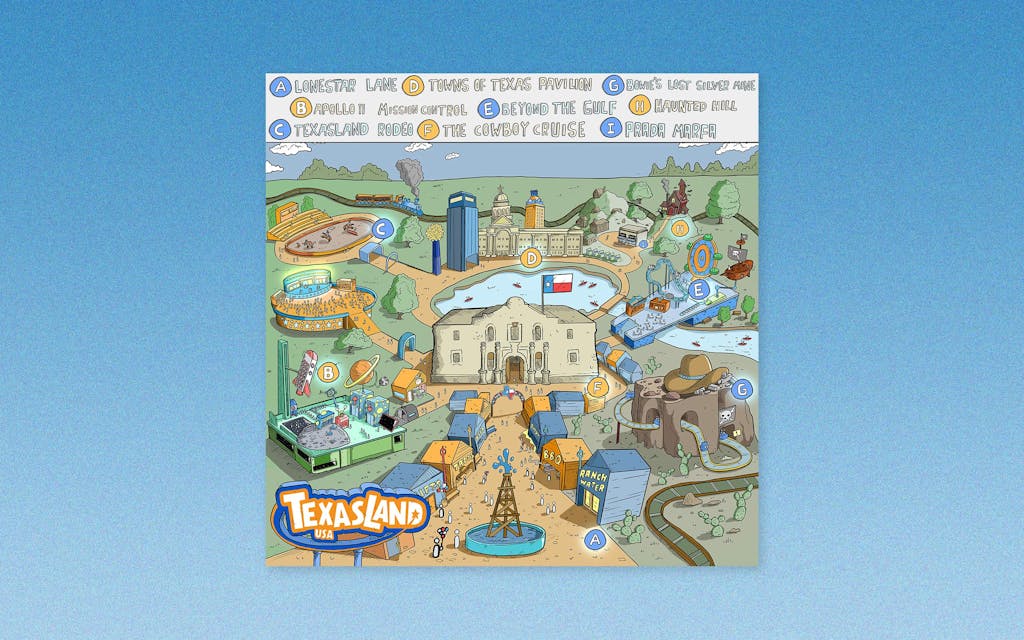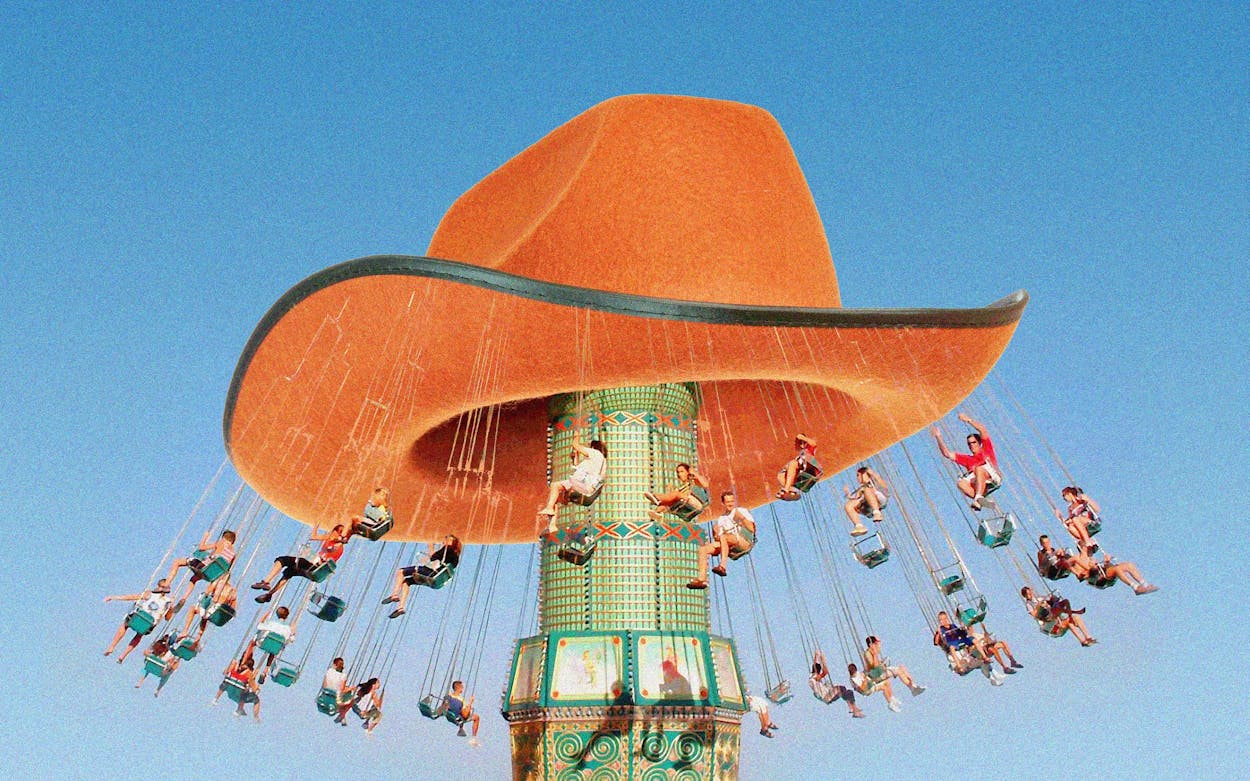Everyone remembers their first visit to the Alamo, if only for the disappointment that sometimes accompanies it. It is a mythologically colossal place that, in reality, can feel quite small, dark, and disconnected from its history. I have been many times, and the most exciting things I ever saw there were an official Alamo cat and some color-changing plastic cups in the gift shop. If one is hoping to immerse oneself in the full 1836 fantasy, good luck doing so with a Ripley’s Believe It or Not! and some (terrible) Harry and Meghan wax statues staring at you from across the street.
But what if you could step inside a building that looks exactly like the Alamo and be transported somewhere fantastical? What if you could walk through its front doors to find a miniature San Antonio River Walk, and a boat that would take you through all the prominent cultures in Texas history before even touching the classic Alamo story?
That’s what Lizzy McGee dreams of. The Houstonian and sixth-generation Texan, a recent graduate of Stanford Graduate School of Business, is moving full steam ahead to build TexasLand, a theme park dedicated to our history and culture. McGee spent her early career as a strategist for Disney, doing market analyses for its theme parks, cruises, and hotels. During the COVID-19 pandemic, she worked remotely from her childhood bedroom, and it was there that she had her epiphany.
“I realized that Texas broadly, and Houston specifically, has all the metrics that my team look[ed] for: a massive and burgeoning population, a business-friendly environment, and, from the content side of things, a unique identity.” Houston hasn’t had a theme park since Astroworld closed in 2005, a decision McGee reminded me was made because the park sat on Six Flags’ most valuable land, which the company chose to sell, not because Astroworld wasn’t profitable.
Even with the promising market, McGee couldn’t envision Disney opening in Houston, because it was too much of an economic risk for such an established brand. “That was a light bulb moment,” she recalls, “when I realized you don’t even need Disney or Universal. Texas itself is its own brand.”
If you look at the sorts of stories that get told in a theme park, Texas has those already baked into our own history. Cowboys? Check. Railroads? Obviously. Astronauts? Heck yeah. Pirates? You betcha. The possibilities are endless.
Now, of course, there is another famous Texas history–themed roller coaster company, but McGee says there’s a difference between an amusement park like Six Flags, with locations all over the country, and the more localized world she envisions. “Six Flags is very ride-focused,” she says. “This is much more story-driven, and you don’t even necessarily need rides.”
Part of the park might be a real tall tale Wild West adventure; another area could be futuristic and space-y. But McGee thinks the heart of TexasLand will be more like New Orleans Square, in Disneyland, or EPCOT, in Disney World: an amusement park that evokes a very clear sense of place, allowing visitors to feel like they’re traveling great distances within a few hundred feet. “You could have the Towns of Texas Pavilion, and have a Matt’s El Rancho in the Austin part, and Lonesome Dove and the Stockyards in the Fort Worth pavilion, and a haunted house in the Marfa pavilion,” she says.

You might ride a whirling cart through Bowie’s Lost Silver Mine, or be flung up in a makeshift rocket ship at Apollo 11: Mission Control, before battling pirates at Beyond the Gulf: Bandits on the High Seas. Concession stands would sell barbecue and ranch water, and one of the daily sources of entertainment would be a real live rodeo.
So committed has McGee been to her dream that TexasLand was the very reason she enrolled in graduate business school in the first place. While there, she took classes on real estate and how to manage a growing venture. She teamed up with two classmates, Gaby Joseph and James Underwood, as well as former Parques Reunidos worker Nick Blackburn, and started earnestly crafting her business plan. They launched a Kickstarter campaign in February of this year and in two months had raised a little over $80,000. The funds will go toward a professional demand study, the sort of intense market analysis that takes into account traffic and weather patterns, which Disney and Universal commission whenever they think about launching a new park. “I’m ninety-nine percent sure it’s going to tell us what we already know—that there is demand for a product like this,” McGee says. The team plans to take the study to potential investors and, from there, move on to site selection and creative development. If all goes according to the group’s incredibly detailed operating plan, the park will have its grand opening in summer 2026.
McGee hopes that TexasLand can be for Texas what Disneyland is for many Californians. “I saw how people in L.A. and Southern California treated Disneyland, like it was in their backyard. They go on a random Tuesday afternoon, or they have their high school grad night there. Houston’s the fourth-largest city in the U.S. We should have something like this in our backyard.”
Though it is generally understood that “everything” is bigger here, TexasLand doesn’t necessarily have to be, says McGee. “There’s this underlying assumption in people’s minds that because the Disneys and the Universals of the world spend capital-b billions on things like Galaxy’s Edge, that’s the amount you need for a successful theme park.” But, she says, people forget about places like Knott’s Berry Farm and Dollywood, which pull in hundreds of millions of dollars in revenue every year while selling less–prohibitively expensive tickets.
Dollywood in particular is a big inspiration for McGee. “What they’ve done so successfully is lean into their Appalachian identity, and they celebrate their region,” she says. Tripadvisor crowned Dollywood the number one theme park in the country last year. McGee sees no reason why we shouldn’t have that too: “Texas has got to have more state pride than Tennessee.”








